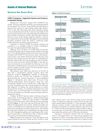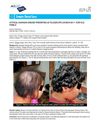
Different types of hair loss can be caused by hormones, stress, autoimmune disorders, illness, or nutritional deficiencies, and can be treated with medication, nutritional supplements, or hair transplantation.
 4 citations,
August 2021 in “GSC biological and pharmaceutical sciences”
4 citations,
August 2021 in “GSC biological and pharmaceutical sciences” Some plants might help prevent or treat hair loss.
[object Object]  2 citations,
June 2020 in “Journal of Drug Delivery and Therapeutics”
2 citations,
June 2020 in “Journal of Drug Delivery and Therapeutics” The document concludes that understanding hair problems can lead to cost-effective solutions and proper treatment choices.
 6 citations,
January 2019 in “Indian Journal of Dermatology”
6 citations,
January 2019 in “Indian Journal of Dermatology” About 12% of children in Kota, Rajasthan, experience hair loss, mainly due to fungal infections, with early treatment advised to prevent worsening.
 213 citations,
December 2020 in “Annals of internal medicine”
213 citations,
December 2020 in “Annals of internal medicine” Many COVID-19 patients still have symptoms like fatigue and loss of taste or smell a month after diagnosis.
 4 citations,
July 2022 in “Veterinary medicine international”
4 citations,
July 2022 in “Veterinary medicine international” Mange in rabbits is a serious disease that can spread to humans and is treated with medications and supportive care.
 7 citations,
January 2017 in “Journal of cosmetology & trichology”
7 citations,
January 2017 in “Journal of cosmetology & trichology” Good nutrition is crucial for healthy hair and can help with hair loss without medication.
 5 citations,
November 2011 in “Expert Review of Dermatology”
5 citations,
November 2011 in “Expert Review of Dermatology” The document concludes that early diagnosis and a comprehensive treatment plan are crucial for managing hair loss in children, with a focus on both medical and psychological support.
 January 2017 in “International journal of clinical & experimental dermatology”
January 2017 in “International journal of clinical & experimental dermatology” Eating a balanced diet with vitamins, micronutrients, and antioxidants is important for hair health and can help with hair loss.
 1250 citations,
August 2021 in “Scientific Reports”
1250 citations,
August 2021 in “Scientific Reports” COVID-19 leaves 80% of patients with long-term symptoms like fatigue and headaches.
 73 citations,
July 2016 in “Cosmetics”
73 citations,
July 2016 in “Cosmetics” Mushrooms have beneficial properties for skin and hair care products and have great potential for future cosmetic use.
 48 citations,
January 2011 in “International journal of trichology”
48 citations,
January 2011 in “International journal of trichology” Intralesional triamcinolone acetonide is the most effective treatment for localized alopecia areata.
 9 citations,
August 2013 in “Facial Plastic Surgery Clinics of North America”
9 citations,
August 2013 in “Facial Plastic Surgery Clinics of North America” Recognize and treat hair loss conditions that mimic androgenetic alopecia by identifying warning signs and using proper tools.
[object Object]  3 citations,
May 2018 in “Journal of nutritional health & food science”
3 citations,
May 2018 in “Journal of nutritional health & food science” Nutritional supplements can help manage hair loss and promote hair growth by strengthening hair roots and countering harmful effects of pollution, smoking, and deficiencies in vitamins and minerals.
 December 2024 in “Nutrients”
December 2024 in “Nutrients” Skin, hair, and nail changes can help detect eating disorders early.
 November 2023 in “International Journal of Trichology”
November 2023 in “International Journal of Trichology” No significant link between hair loss and iron or thyroid levels was found, but checking for deficiencies might still be useful.
 6 citations,
November 2018 in “Journal of Critical Care”
6 citations,
November 2018 in “Journal of Critical Care” Many survivors of critical illness, especially those with sepsis, experience hair loss.
 1 citations,
January 2006 in “Elsevier eBooks”
1 citations,
January 2006 in “Elsevier eBooks” The conclusion is that different types of hair loss in dogs and cats can be cosmetic or serious, and affected animals should not be bred.
 September 2016 in “Elsevier eBooks”
September 2016 in “Elsevier eBooks” Different types of hair loss in dogs and cats have various causes and treatments, with outcomes ranging from good to uncertain.
 January 2011 in “Elsevier eBooks”
January 2011 in “Elsevier eBooks” Alopecia in animals can be hereditary, congenital, or acquired, with treatments and outcomes varying widely.
 114 citations,
January 2021 in “medRxiv (Cold Spring Harbor Laboratory)”
114 citations,
January 2021 in “medRxiv (Cold Spring Harbor Laboratory)” COVID-19 can cause over 50 long-term symptoms, with fatigue and headache being the most common.
3 citations,
May 2022 in “Pediatric Critical Care Medicine” The patient recovered well and returned to college without any lasting issues.
 84 citations,
March 2010 in “Infectious Disease Clinics of North America”
84 citations,
March 2010 in “Infectious Disease Clinics of North America” The document concludes that rapid identification, isolation, and strict infection control are crucial to manage SARS outbreaks.
 4 citations,
January 2016 in “Case reports in dermatological medicine”
4 citations,
January 2016 in “Case reports in dermatological medicine” A man had temporary hair loss from radiation during a medical procedure but regrew his hair after treatment with minoxidil lotion.
 May 2012 in “Surgery (oxford)”
May 2012 in “Surgery (oxford)” Patients who survive critical illness often face long-lasting physical, mental, and cognitive issues, with many unable to return to work within a year.
 March 2024 in “CRC Press eBooks”
March 2024 in “CRC Press eBooks” Telogen effluvium is a type of hair loss where more hair than normal falls out after stress or illness.
 March 2015 in “CRC Press eBooks”
March 2015 in “CRC Press eBooks” Telogen effluvium is a type of hair loss in women caused by many factors, and iron and thyroid tests are recommended for diagnosis.
1 citations,
January 2021 in “Wits Journal of Clinical Medicine” Long COVID causes lasting symptoms and needs ongoing care.
 May 2021 in “Journal of the American College of Cardiology”
May 2021 in “Journal of the American College of Cardiology” An 11-year-old girl with Kawasaki disease experienced hair loss that improved after treatment.
 March 2015 in “Surgery (oxford)”
March 2015 in “Surgery (oxford)” Critical illness can lead to long-lasting physical and psychological problems, requiring ongoing, specialized care and rehabilitation.



























